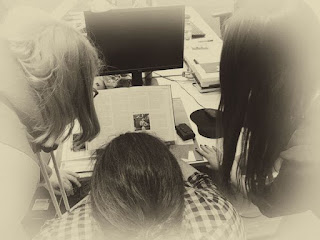One of the possible ways to spread findings of disability history and reflections on disability in past and present is to teach them in history lessons in schools. Therefore, it could be useful to familiarize aspiring history teachers with the oppurtunities and challanges of disability history for historical thinking during their studies.
In Germany, most people studying history on university level are going to be teachers later in their career. This post presents a selection of works by students in a seminar at Kiel University in summer term 2017. In total, the seminar was attended by 15 students. In terms of content, the students dealt with disability history on two levels: 1) as an independent scholarly exploration of a specific historical phenomenon and 2) with regard to the question how lesson material could be developed for history lessons in schools. Both levels are challenging. Among other things, because there is hardly any teaching material on disability history for schooling (a few examples are here and here). Likewise, the topic tends to occupy a marginal position in the academic training of history teachers, much more marginal than other difference categories such as gender, class and race. However, it has rarely been so easy to teach disability history in schools. At least in Germany. Unlike a few years ago, the curricula in most regions now only require schools to work along meta-concepts of historical thinking instead of dictating specific content. The concrete content for history lessons can now be selected by the teachers. Therefore, disability history can serve as a wonderful example to address issues such as power and powerlessness, exclusion and emancipation, domination and resistance. In addition, the topic can illustrate how ideas of normality and deviation have grown historically.
Disability History can enrich the history lesson. However, school practice is changing slowly. Innovations are often not easy to enforce (see Tyack and Cuban 1994). At the same time, the perspectives of disability history and the critique on dominant ideologies associated with it are becoming increasingly important. History as a subject in schools is exposed to the pressure of political influence. With the rise of nationalist tendencies in many Western countries, it is also demanded to use lessons for building national identities among the school students (see Jaskulowski, Majewski & Surmiak 2017; Bernhardt 2016).
In the seminar, the students worked on issues of disability history and were asked to produce a popularized text. We are happy to present a collection of four works, which address disability history in a broad understanding:
- Julie Burmeister interviewed a "Lebensborn"- child and her experiences of being a "result" of Nazi ideology.
- Valerio Majer tells the story of "Jugendwerkhöfe", an institution for deviant young people in East-Germany.
- Clara Moltrecht asks if autism is a "fad diagnosis".
- Julia Bruns tells us something about left-handedness in past and present (the text is in German language only. Specific expressions were difficult to translate into English).
We hope that you enjoy reading. If you're interested in more works from students of history on disability history you don't have to wait long. In a couple of weeks Bettina Alavi from University of Education Heidelberg will present blogs of her students.
Recommended Citation:
Sebastian Barsch (2018): Disability History meets Teacher Education. In: Public Disability History 3
(2018) 1.



